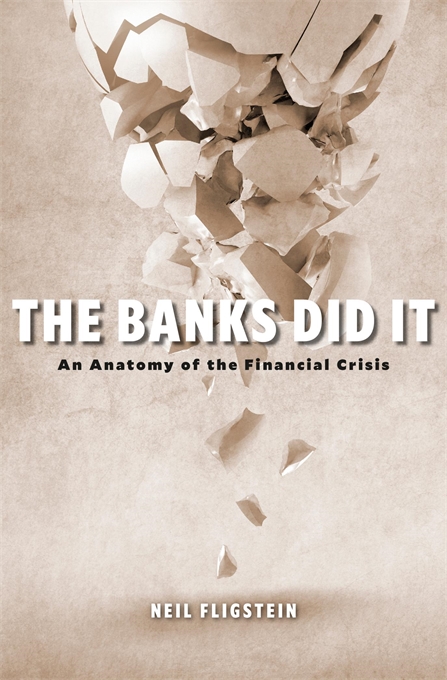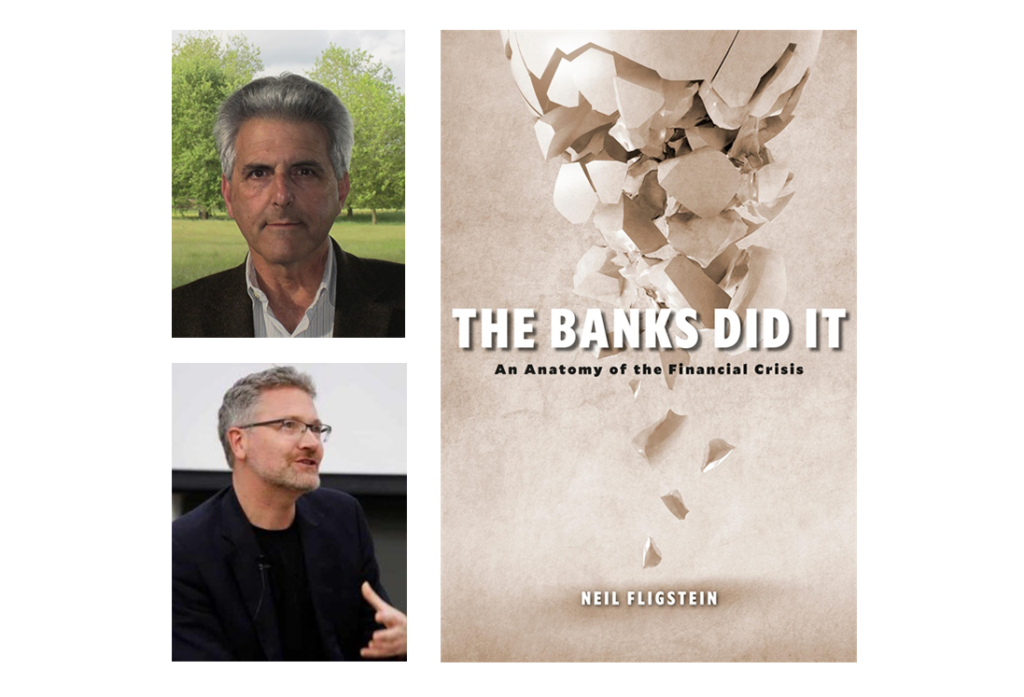Please join us on December 3, 12pm PST for an “Authors Meet Critics” discussion focused on The Banks Did It: An Anatomy of the Financial Crisis, by Neil Fligstein, Class of 1939 Chancellor’s Professor in the UC Berkeley Department of Sociology. Professor Fligstein will be joined in conversation by Adam Tooze, Kathryn and Shelby Cullom Davis Professor of History at Columbia University and author of Crashed: How a Decade of Financial Crises Changed the World (2018).
Register Here
About the Book
 More than a decade after the 2008 financial crisis plunged the world economy into recession, we still lack an adequate explanation for why it happened. Existing accounts identify a number of culprits—financial instruments, traders, regulators, capital flows—yet fail to grasp how the various puzzle pieces came together. The key, Neil Fligstein argues, is the convergence of major U.S. banks on an identical business model: extracting money from the securitization of mortgages. But how, and why, did this convergence come about?
More than a decade after the 2008 financial crisis plunged the world economy into recession, we still lack an adequate explanation for why it happened. Existing accounts identify a number of culprits—financial instruments, traders, regulators, capital flows—yet fail to grasp how the various puzzle pieces came together. The key, Neil Fligstein argues, is the convergence of major U.S. banks on an identical business model: extracting money from the securitization of mortgages. But how, and why, did this convergence come about?
The Banks Did It: An Anatomy of the Financial Crisis carefully takes the reader through the development of a banking industry dependent on mortgage securitization. Fligstein documents how banks, with help from the government, created the market for mortgage securities. The largest banks—Countrywide Financial, Bear Stearns, Citibank, and Washington Mutual—soon came to participate in every aspect of this market. Each firm originated mortgages, issued mortgage-backed securities, sold those securities, and, in many cases, acted as their own best customers by purchasing the same securities. Entirely reliant on the throughput of mortgages, these firms were unable to alter course even when it became clear that the market had turned on them in the mid-2000s.
With the structural features of the banking industry in view, the rest of the story falls into place. Fligstein explains how the crisis was produced, where it spread, why regulators missed the warning signs, and how banks’ dependence on mortgage securitization resulted in predatory lending and securities fraud. An illuminating account of the transformation of the American financial system, The Banks Did It offers important lessons for anyone with a stake in avoiding the next crisis.
About the Panelists
Neil Fligstein is the Class of 1939 Chancellor’s Professor. He is also the Director of the Center for Culture, Organization, and Politics. He is Co-Chair with Steve Vogel of the Network for a New Political Economy. His main research interests lie in the fields of economic sociology, political economy, and organizational theory. He has been interested in developing and using a sociological view of how new social institutions emerge, remain stable, and are transformed to study a wide variety of seemingly disparate phenomena including the history of the large American corporation, the construction of a European legal and political system, and the financial crisis of 2007-2009. He has used this framework to create a more general view of how markets and states are mutually constitutive and applied this framework to trying to make sense of how global markets work. In 2008, he published a book entitled Euroclash: The EU, European Identity, and the future of Europe (Oxford, Eng.: Oxford University Press, 2008). The central theme of the book is to document how European integration in the past 20 years has created a partial integration of European societies along political, economic, but most importantly social lines. His book with Doug McAdam, titled of A Theory of Fields (Oxford University Press, 2012), is a theoretical work that tries to combine insights from institutional theory, social movements theory, and organizational theory to create a general set of understandings of how new social spaces are constructed, maintained, and transformed. Professor Fligstein has written a series of papers with Adam Goldstein, Jacob Habinek, Jonah Stuart Brundage, Michael Schultz, Alex Roehrkasse and Zawadi Rucks Ahidiana about the financial crisis that swept the industrialized world in 2008.
Adam Tooze holds the Shelby Cullom Davis chair of History at Columbia University and serves as Director of the European Institute. He teaches and researches widely in the fields of twentieth-century and contemporary history. From a start in modern German history with a special focus on the history of economics and economic history his interests have widened to take in a range of themes in political, intellectual and military history, across a canvass stretching from Europe across the Atlantic. His first book, Statistics and the German State: the Making of Modern Economic Knowledge appeared in 2001. Wages of Destruction: the Making and Breaking of the Nazi Economy, was published in 2006 and Deluge: The Great War and the Remaking of the Global Order 1916-1931 in 2014. For these books Adam won the Leverhulme prize fellowship, the H-Soz-Kult Historisches Buch Prize, the Longman History Today Prize, the Wolfson Prize and the LA Times History Prize. He was shortlisted for the Kirkus review, Duff Cooper and Hessel Tiltman prize and his books have featured in the book of the year lists of the Financial Times, LA Times, Kirkus Review, Foreign Affairs and the Economist. His most recent book was Crashed: How a Decade of Financial Crises Changed the World (2018). His most recent book is Shutdown: How Covid Shook the World’s Economy. He has written and reviewed for the Financial Times, the Guardian, the Sunday Telegraph, the TLS, the LRB, the New left Review, the New Statesman, the WSJ, the New York Times, the New York Review of books, Dissent, Die Zeit, Spiegel, TAZ and the Sueddeutsche Zeitung.
